Unit 2 I think that mooncakes are delicious Section A(3a-4c) 原创教学课件(共43张PPT)+内嵌视频
文档属性
| 名称 | Unit 2 I think that mooncakes are delicious Section A(3a-4c) 原创教学课件(共43张PPT)+内嵌视频 |
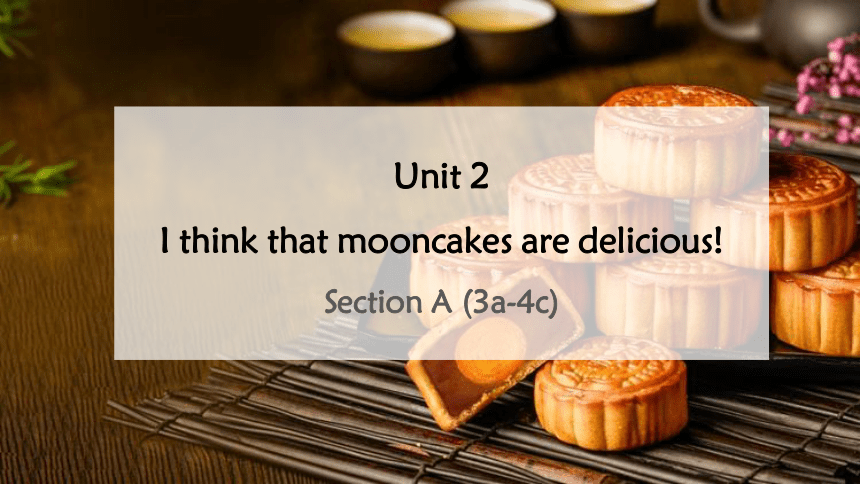
|
|
| 格式 | pptx | ||
| 文件大小 | 76.7MB | ||
| 资源类型 | 试卷 | ||
| 版本资源 | 人教新目标(Go for it)版 | ||
| 科目 | 英语 | ||
| 更新时间 | 2022-10-19 00:00:00 | ||
图片预览

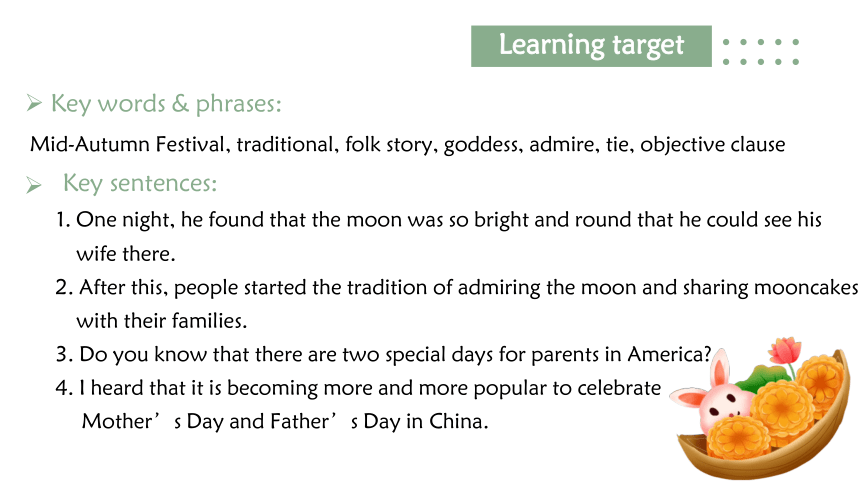
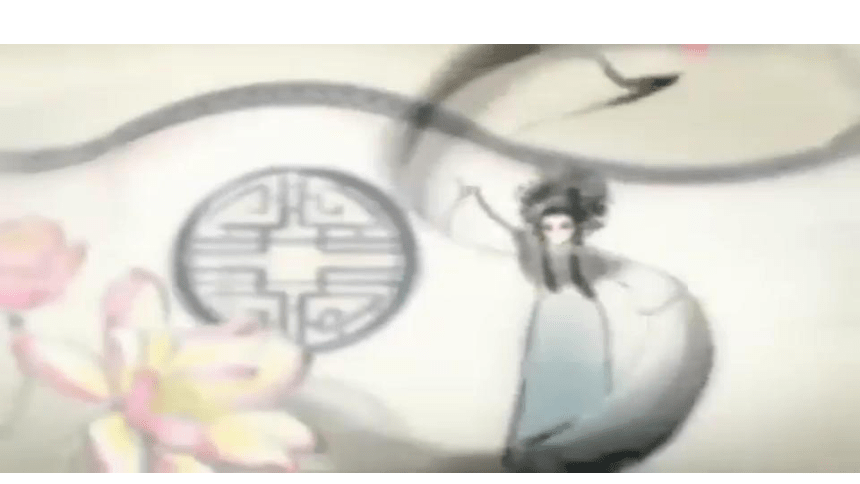
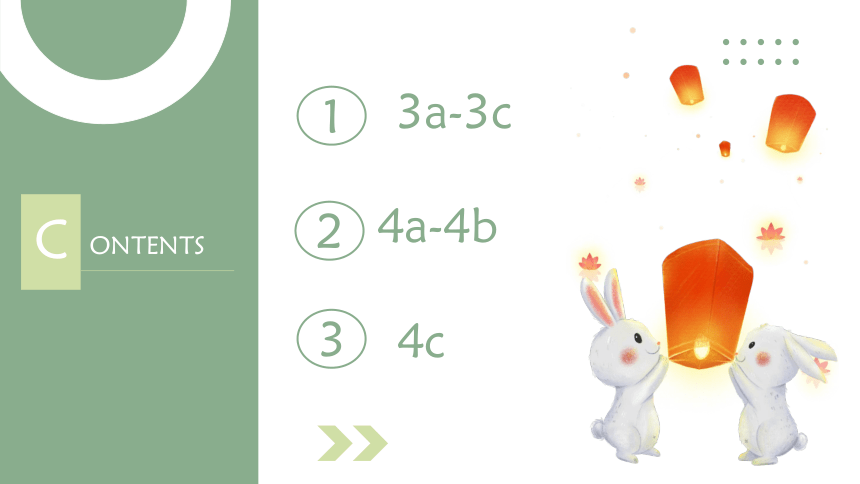
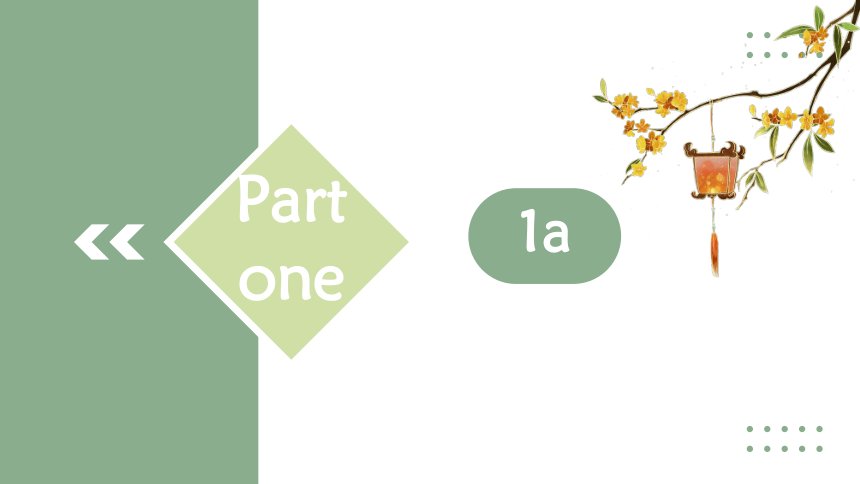
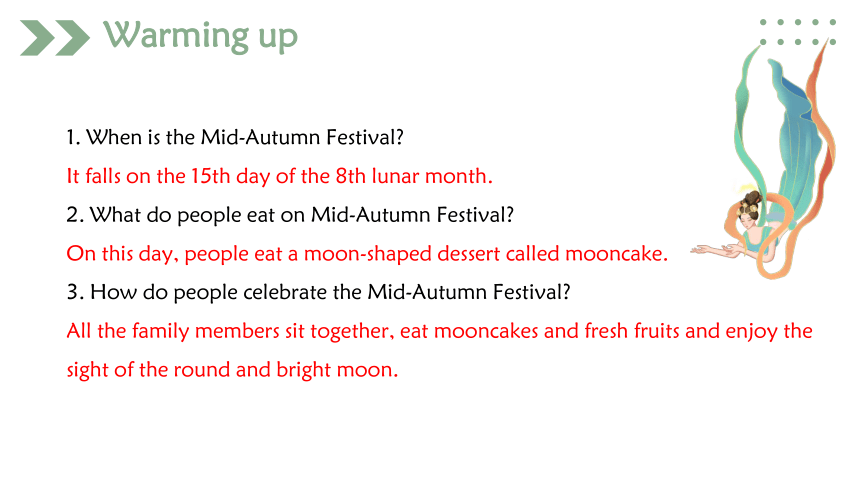
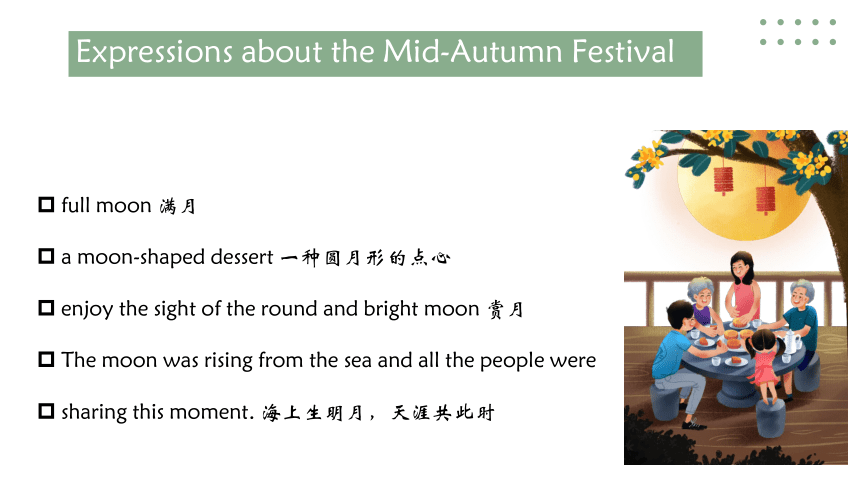
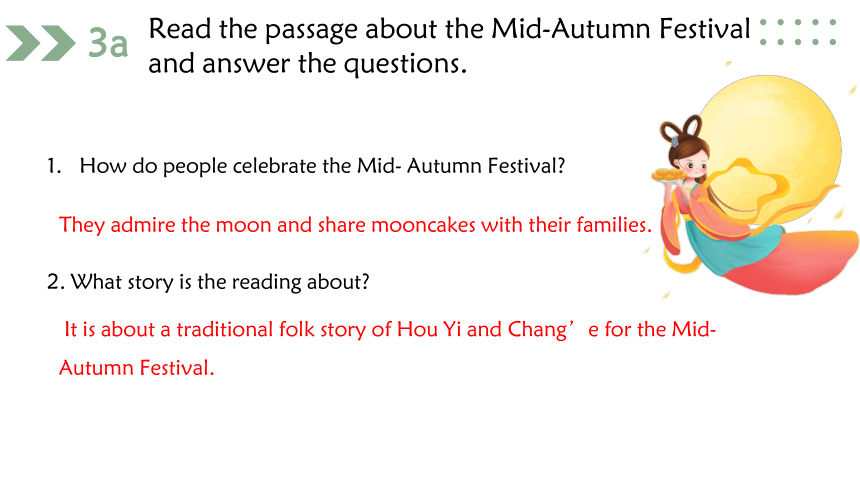
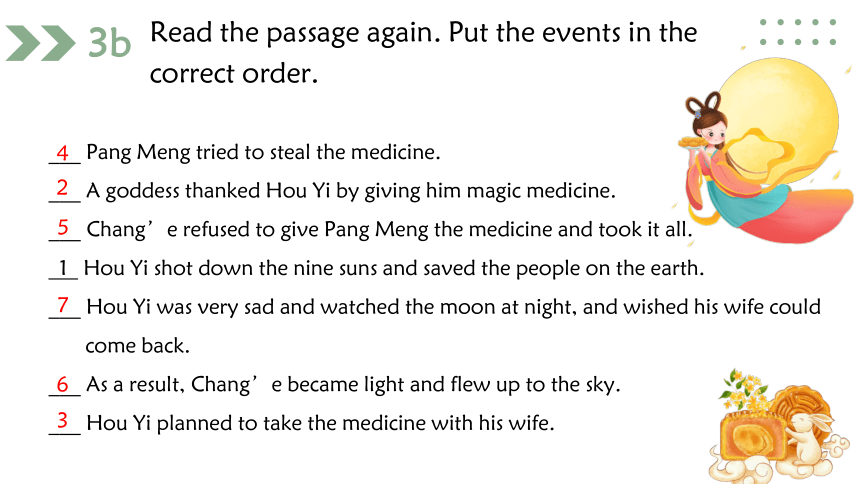
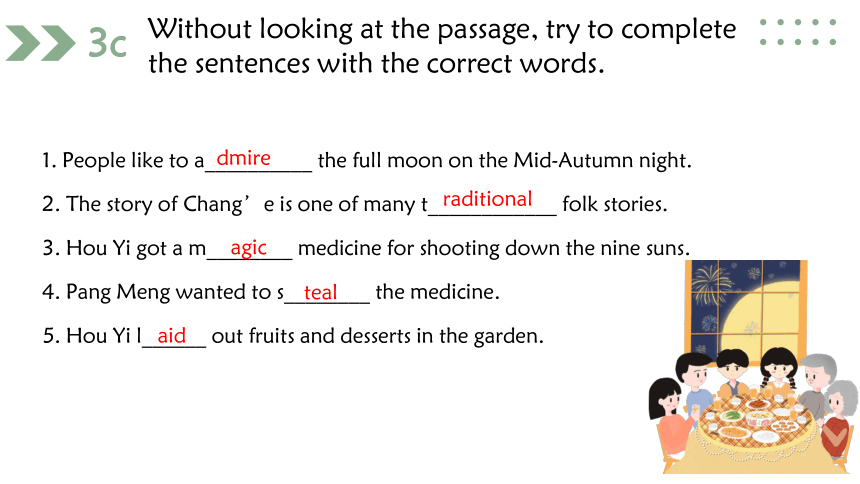
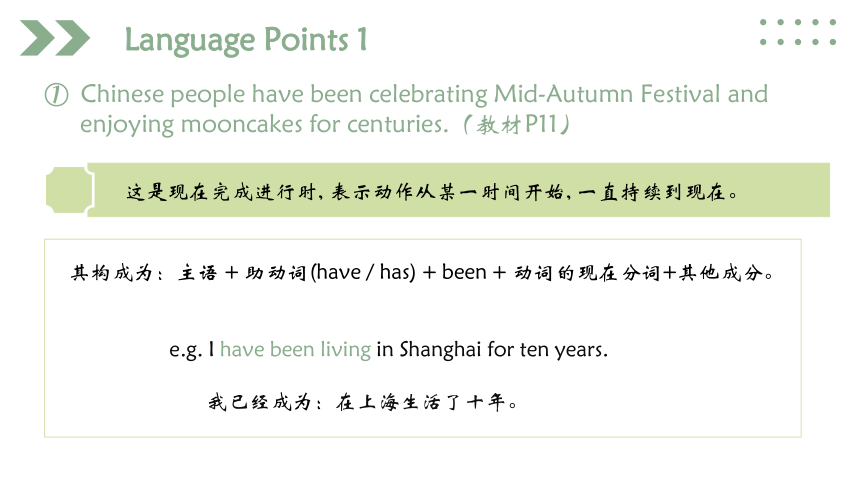
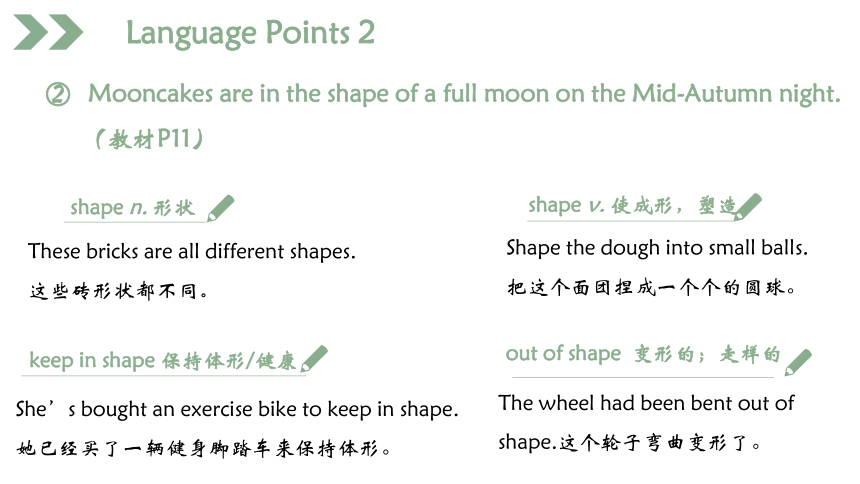
文档简介
(共43张PPT)
Unit 2
I think that mooncakes are delicious!
Section A (3a-4c)
Key words & phrases:
Mid-Autumn Festival, traditional, folk story, goddess, admire, tie, objective clause
Learning target
Key sentences:
1. One night, he found that the moon was so bright and round that he could see his
wife there.
2. After this, people started the tradition of admiring the moon and sharing mooncakes
with their families.
3. Do you know that there are two special days for parents in America
4. I heard that it is becoming more and more popular to celebrate
Mother’s Day and Father’s Day in China.
C
ONTENTS
3a-3c
1
4a-4b
4c
2
3
Part one
1a
合同权利义务
合同履行违约
Warming up
1. When is the Mid-Autumn Festival
It falls on the 15th day of the 8th lunar month.
2. What do people eat on Mid-Autumn Festival
On this day, people eat a moon-shaped dessert called mooncake.
3. How do people celebrate the Mid-Autumn Festival
All the family members sit together, eat mooncakes and fresh fruits and enjoy the sight of the round and bright moon.
full moon 满月
a moon-shaped dessert 一种圆月形的点心
enjoy the sight of the round and bright moon 赏月
The moon was rising from the sea and all the people were
sharing this moment. 海上生明月,天涯共此时
Expressions about the Mid-Autumn Festival
3a
How do people celebrate the Mid- Autumn Festival
2. What story is the reading about
Read the passage about the Mid-Autumn Festival and answer the questions.
They admire the moon and share mooncakes with their families.
It is about a traditional folk story of Hou Yi and Chang’e for the Mid-Autumn Festival.
___ Pang Meng tried to steal the medicine.
___ A goddess thanked Hou Yi by giving him magic medicine.
___ Chang’e refused to give Pang Meng the medicine and took it all.
1 Hou Yi shot down the nine suns and saved the people on the earth.
___ Hou Yi was very sad and watched the moon at night, and wished his wife could
come back.
___ As a result, Chang’e became light and flew up to the sky.
___ Hou Yi planned to take the medicine with his wife.
2
3
4
5
6
7
3b
Read the passage again. Put the events in the
correct order.
3c
Without looking at the passage, try to complete
the sentences with the correct words.
1. People like to a__________ the full moon on the Mid-Autumn night.
2. The story of Chang’e is one of many t____________ folk stories.
3. Hou Yi got a m________ medicine for shooting down the nine suns.
4. Pang Meng wanted to s________ the medicine.
5. Hou Yi l______ out fruits and desserts in the garden.
dmire
raditional
agic
teal
aid
Language Points 1
Chinese people have been celebrating Mid-Autumn Festival and enjoying mooncakes for centuries.(教材P11)
这是现在完成进行时, 表示动作从某一时间开始, 一直持续到现在。
e.g. I have been living in Shanghai for ten years.
我已经成为:在上海生活了十年。
其构成为:主语 + 助动词(have / has) + been + 动词的现在分词+其他成分。
Language Points 2
Mooncakes are in the shape of a full moon on the Mid-Autumn night. (教材P11)
shape n. 形状
These bricks are all different shapes.
这些砖形状都不同。
shape v. 使成形,塑造
Shape the dough into small balls.
把这个面团捏成一个个的圆球。
keep in shape 保持体形/健康
She’s bought an exercise bike to keep in shape.
她已经买了一辆健身脚踏车来保持体形。
out of shape 变形的;走样的
The wheel had been bent out of
shape.这个轮子弯曲变形了。
Language Points 3
Whoever took this could live forever, and Hou Yi planned to take
it with Chang’e.(教材P11)
whoever pron. 无论谁, 不管什么人
whoever作代词, 在此处引导
主语从句, 相当于anyone who
Can whoever leaves last
please lock the door
最后走的人请把门锁上好吗?
whoever还可引导让步状语从句, 相当于no matter who, 意为“无论谁; 不管什么人
I don’t want to see them,
whoever they are.
我不想见到他们, 不管他们是谁。
e.g. You can do it however you like, it really doesn’t matter.
你想怎么做就可以怎么做,真的没什么关系。
e.g. He was an honest man. However, he didn’t tell the truth.
他是一个诚实的人。然而, 他并没有讲实话。
Language Points 4
However, a bad man, Pang Meng, tried to steal the medicine when Hou Yi was not home.(教材P11)
however adv. 然而
however还可以作副词, 表示“无论到什么程度; 不管多么”。
辨析: however与but
however adv. “但是;然而” 可位于句首、句中(前后用逗号)、句末(其前用逗号)。 I told him to come here.
However, he didn’t come.
我告诉他来这儿,然而他没来。
but conj. “但是”位于句中 Tom was ill, but he still went to work.
Tom.
病了, 但他仍然去上班。
steal作动词, 其过去式和过去分词分别为stole和stolen。
steal sth. from ... 意为“从......偷某物”。
e.g. She stole the shoes from right under the
assistant’s nose.
她把鞋从售货员的鼻子底下偷走。
However, a bad man, Pang Meng, tried to steal the medicine when Hou Yi was not home.(教材P11)
Language Points 5
Chang’e refused to give it to him and took it all. (教材P11)
refuse v. “拒绝”,反义词为accept, 意为“接受”
e.g. He refused my invitation. 他拒绝了我的邀请。
refuse to do sth. 拒绝做某事
e.g. We refused to change our plan.
我们拒绝改变我们的计划。
Language Points 6
He quickly laid out her favorite fruits and desserts in the garden. (教材P11)
1. lay out为固定搭配, 其中lay作动词, 意为“放置; 安放”
e.g. Lay out the map on the table and let’s have a look.
把地图放在桌子上, 我们一起来看一看。
2. lay作动词还可以表示“下(蛋); 产(卵)”。
e.g. The hen laid an egg and sang happily.
这只母鸡下了一个蛋, 开心地唱着歌。(拟人)
Language Points 6
After this, people started the tradition of admiring the moon and
sharing mooncakes with their families.(教材P11)
tradition n. 传统;惯例
作“传统”讲是不可数名词;
作 “惯例; 传统(风俗)”讲是可数名词。
traditional adj . 传统的
tradition的词形变化:
traditionally adv .传统地
admire v. 欣赏; 仰慕
1.admire sb. for (doing) sth. 因(做)某事而钦佩某人
e.g. We all admire him for his ability to sing.
我们都因为他的歌唱能力而欣赏他。
2.admire sb. / sth. 欣赏某人/某事
Language Points 7
As a result, Chang’e became light and flew up to the sky. (教材P11)
as a result的意思是“结果是”, 后面一般用逗号隔开。
e.g. He stayed up late last night. As a result, he was late for school.
他昨晚熬夜到很晚, 结果是他上学迟到了
as a result of的意思是“因为, 由于”, 相当于because of。
e.g. The train was late as a result of the heavy snow.
由于大雪的缘故火车晚点了。
Part two
4a-4b
Grammar Focus 1:宾语从句
Read the sentences and find out the common features.
I know that the Water Festival is really fun.
I wonder if they’ll have the races again next year.
I wonder whether June is a good time to visit Hong Kong.
I believe that April is the hottest month in Thailand.
主语+谓语
that/if/whether
宾语从句
1.1 连接词:that、if和whether引导的宾语从句
1.定义:在句中作宾语的句子叫作宾语从句。
2.语序:宾语从句要用陈述句语序。
3.引导词
(1)that用于引导原句为陈述句的宾语从句,此时that无实际意义,也不在句中充当任何成分,在口语和非正式文体中可以省略。
例:He told me (that) he would go to the college the next year.
他告诉我他明年上大学。
I believe (that)you will succeed in the future.我相信你将来会成功的。
例:I don't know if/whether there will be a bus anymore.
我不知道是否还会有公交车。
Nobody knew if/whether he could pass the exam.
没人知道他是否会通过考试。
(2)if和whether引导的宾语从句多是由一般疑问句转换而来,即将原来的疑问句语序改为陈述句语序。if和whether意为“是否”。
whether和if可以完全通用吗?
01
02
03
只用whether,不用if的情况
与or not连用时
I don't know whether he will come or not.我不知道他是否会来。
介词之后只能用whether
I'm interested in whether he likes English.我对他是否喜欢英语感兴趣。
不定式之前只能用whether
I don't know whether to go.我不知道是否要去。
04
05
只用whether,不用if的情况
置于句首时,whether不能替换为if
Whether she will come or not isn't know yet. 我不知道她是否会来。
用if易引起歧义时
Please let me know whether you like the book.
请让我知道你是否喜欢这本书。
1. 当主句是一般现在时,宾语从句的时态不作限制,我们可以根据句子的意思来使用需要的任何一种时态。
I hear (that)
Jim went to work an hour ago.
he is interested in English.
she will come tomorrow.
Tom has been to London twice.
1.2 宾语从句的时态
2. 当主句是一般过去时的时候,宾语从句必须运用相应的过去的某一种时态,从而达到主句和从句的相互一致。
He will go to Hong Kong .
He is sick.
He is reading a book .
He has finished his work.
He said
He had finished his work.
He would go to Hong Kong .
He was sick.
He was reading a book .
3. 当宾语从句说明的是客观存在的事实或者是客观存在的真理时就不用受到主句时态的限制,仍是用一般现在时态。
the sun is much bigger than the moon .
summer is after spring .
the earth moves around the sun.
He told me (that)
We knew (that)
The teacher told us (that)
宾语从句三要素
引导词
that
if/whether
特殊疑问词
时态
主句为一般现在时
主句为一般过去时
一般过去时
过去将来时
过去进行时
过去完成时
语序
宾语从句的语序都为陈述句语序
从句客观真理时态不变
从句可为任何时态
宾语从句的总结
Read the sentences and find out the common features.
What fun the Water Festival is!
How fantic the dragon boat teams were!
How pretty the dragon boats were!
How delicious the food is in Hong Kong!
What / How
名词/形容词/副词
主语+谓语+其他!
Grammar Focus 2:感叹句
感叹句是表示赞美、惊叹、喜悦等感情的句子。感叹句的句尾句尾用感叹号“!”,读降调。
What引导的感叹句
What + a / an + adj. + 可数名词单数 + 陈述句!
What a beautiful girl she is!
What + adj. + 可数名词复数 + 陈述句!
What big coconuts these are!
What + adj. + 不可数名词 + 陈述句!
What nice weather it is!
How引导的感叹句
How + adj. / adv. + 陈述句
(主语 + 谓语)!
How fine the weather is!
How high the kite is flying!
How+ 主语 + 谓语!
How time flies!
Write sentences using the words given.
1. think / Lantern Festival / beautiful
___________________________________________________
2. don’t know / whether / he / come home / for the festival
___________________________________________________
3. believe / Water Festival / most / fun
___________________________________________________
I think that the Lantern Festival is beautiful.
I don’t know whether he will come home for the festival.
I believe that the Water Festival is the most fun.
4a
4. wonder / if / mooncakes / delicious
_______________________________________________
5. how / exciting / races
______________________________________________
6. what / interesting / city
_______________________________________________
I wonder if the mooncakes are delicious.
How exciting the races were!
What an interesting city (Hong Kong is)!
Dear Xia Yu,
Do you know that there are two special days for parents in America One is Mother’s Day on the second Sunday of May, and the other is Father’s Day on the third Sunday of June. On these two days, American children often give gifts to their parents or take them out for lunch or dinner.
Read the passage below and underline the objective clauses. If possible write your own sentences about Mother’s Day and Father’s Day using objective clauses.
one ... the other ... 一个......另一个......
表示特定范围内两个事物的不同情况。
4b
Common gifts are flowers and cards for mothers and shirts or ties for fathers. I heard that it is becoming more and more popular to celebrate Mother’s Day and Father’s Day in China. I wonder if children over there also give similar gifts to their parents. I believe that there are many ways to show our love. Actually, we don’t have to spend a lot of money. It is also a good idea to help parents to do something instead.
June
n. 领带 v. 捆;束
当其作动词时, 过去式和过去分词均为tied, 现在分词为tying。
Part three
4c
Which festival do you like best Ask your group and
report to the class.
e.g. In our group, David’s favorite festival is ... He thinks that ...
4c
Name Favorite festival Reason(s)
Exercise
一、将下列句子改为感叹句。
1. The girl is very clever.
_____ ______ the girl is!
2. It is a wonderful experience.
_____ ______ wonderful experience it is!
3. The wind is blowing strongly.
_____ _______ the wind is blowing!
4. The news is exciting.
_____ _______ news it is!
5. The sweaters are very nice.
_____ ______ sweaters they are!
How clever
What a
How strongly
What exciting
What nice
二、单项选择
1. A goddess gave Hou Yi some magic medicine_______ him.
A. thank B. to thank C. thanks D. thanking
2. I wonder _______ all the Chinese celebrate Mid-Autumn Festival with their families.
A. if B. what C. that D. weather
3. There are many traditional folk stories _______ the Dragon Boat Festival.
A. for B. on C. about D. with
4. Long long ago, there were ten suns. Hou Yi_______ the nine suns and saved the people
on the earth.
A. put down B. write down C. shot down D. shut down
B
A
C
C
03
Learned a traditional folk story about Mid-Autumn Festival.
01
Learned the Objective Clause with “that”,“whether” and “if”.
02
Summary
Learned the Exclamatory Sentence.
04
Learned some words and expressions
Next
I think that mooncakes are delicious!
Section B (1a-1e)
Unit 2
I think that mooncakes are delicious!
Section A (3a-4c)
Key words & phrases:
Mid-Autumn Festival, traditional, folk story, goddess, admire, tie, objective clause
Learning target
Key sentences:
1. One night, he found that the moon was so bright and round that he could see his
wife there.
2. After this, people started the tradition of admiring the moon and sharing mooncakes
with their families.
3. Do you know that there are two special days for parents in America
4. I heard that it is becoming more and more popular to celebrate
Mother’s Day and Father’s Day in China.
C
ONTENTS
3a-3c
1
4a-4b
4c
2
3
Part one
1a
合同权利义务
合同履行违约
Warming up
1. When is the Mid-Autumn Festival
It falls on the 15th day of the 8th lunar month.
2. What do people eat on Mid-Autumn Festival
On this day, people eat a moon-shaped dessert called mooncake.
3. How do people celebrate the Mid-Autumn Festival
All the family members sit together, eat mooncakes and fresh fruits and enjoy the sight of the round and bright moon.
full moon 满月
a moon-shaped dessert 一种圆月形的点心
enjoy the sight of the round and bright moon 赏月
The moon was rising from the sea and all the people were
sharing this moment. 海上生明月,天涯共此时
Expressions about the Mid-Autumn Festival
3a
How do people celebrate the Mid- Autumn Festival
2. What story is the reading about
Read the passage about the Mid-Autumn Festival and answer the questions.
They admire the moon and share mooncakes with their families.
It is about a traditional folk story of Hou Yi and Chang’e for the Mid-Autumn Festival.
___ Pang Meng tried to steal the medicine.
___ A goddess thanked Hou Yi by giving him magic medicine.
___ Chang’e refused to give Pang Meng the medicine and took it all.
1 Hou Yi shot down the nine suns and saved the people on the earth.
___ Hou Yi was very sad and watched the moon at night, and wished his wife could
come back.
___ As a result, Chang’e became light and flew up to the sky.
___ Hou Yi planned to take the medicine with his wife.
2
3
4
5
6
7
3b
Read the passage again. Put the events in the
correct order.
3c
Without looking at the passage, try to complete
the sentences with the correct words.
1. People like to a__________ the full moon on the Mid-Autumn night.
2. The story of Chang’e is one of many t____________ folk stories.
3. Hou Yi got a m________ medicine for shooting down the nine suns.
4. Pang Meng wanted to s________ the medicine.
5. Hou Yi l______ out fruits and desserts in the garden.
dmire
raditional
agic
teal
aid
Language Points 1
Chinese people have been celebrating Mid-Autumn Festival and enjoying mooncakes for centuries.(教材P11)
这是现在完成进行时, 表示动作从某一时间开始, 一直持续到现在。
e.g. I have been living in Shanghai for ten years.
我已经成为:在上海生活了十年。
其构成为:主语 + 助动词(have / has) + been + 动词的现在分词+其他成分。
Language Points 2
Mooncakes are in the shape of a full moon on the Mid-Autumn night. (教材P11)
shape n. 形状
These bricks are all different shapes.
这些砖形状都不同。
shape v. 使成形,塑造
Shape the dough into small balls.
把这个面团捏成一个个的圆球。
keep in shape 保持体形/健康
She’s bought an exercise bike to keep in shape.
她已经买了一辆健身脚踏车来保持体形。
out of shape 变形的;走样的
The wheel had been bent out of
shape.这个轮子弯曲变形了。
Language Points 3
Whoever took this could live forever, and Hou Yi planned to take
it with Chang’e.(教材P11)
whoever pron. 无论谁, 不管什么人
whoever作代词, 在此处引导
主语从句, 相当于anyone who
Can whoever leaves last
please lock the door
最后走的人请把门锁上好吗?
whoever还可引导让步状语从句, 相当于no matter who, 意为“无论谁; 不管什么人
I don’t want to see them,
whoever they are.
我不想见到他们, 不管他们是谁。
e.g. You can do it however you like, it really doesn’t matter.
你想怎么做就可以怎么做,真的没什么关系。
e.g. He was an honest man. However, he didn’t tell the truth.
他是一个诚实的人。然而, 他并没有讲实话。
Language Points 4
However, a bad man, Pang Meng, tried to steal the medicine when Hou Yi was not home.(教材P11)
however adv. 然而
however还可以作副词, 表示“无论到什么程度; 不管多么”。
辨析: however与but
however adv. “但是;然而” 可位于句首、句中(前后用逗号)、句末(其前用逗号)。 I told him to come here.
However, he didn’t come.
我告诉他来这儿,然而他没来。
but conj. “但是”位于句中 Tom was ill, but he still went to work.
Tom.
病了, 但他仍然去上班。
steal作动词, 其过去式和过去分词分别为stole和stolen。
steal sth. from ... 意为“从......偷某物”。
e.g. She stole the shoes from right under the
assistant’s nose.
她把鞋从售货员的鼻子底下偷走。
However, a bad man, Pang Meng, tried to steal the medicine when Hou Yi was not home.(教材P11)
Language Points 5
Chang’e refused to give it to him and took it all. (教材P11)
refuse v. “拒绝”,反义词为accept, 意为“接受”
e.g. He refused my invitation. 他拒绝了我的邀请。
refuse to do sth. 拒绝做某事
e.g. We refused to change our plan.
我们拒绝改变我们的计划。
Language Points 6
He quickly laid out her favorite fruits and desserts in the garden. (教材P11)
1. lay out为固定搭配, 其中lay作动词, 意为“放置; 安放”
e.g. Lay out the map on the table and let’s have a look.
把地图放在桌子上, 我们一起来看一看。
2. lay作动词还可以表示“下(蛋); 产(卵)”。
e.g. The hen laid an egg and sang happily.
这只母鸡下了一个蛋, 开心地唱着歌。(拟人)
Language Points 6
After this, people started the tradition of admiring the moon and
sharing mooncakes with their families.(教材P11)
tradition n. 传统;惯例
作“传统”讲是不可数名词;
作 “惯例; 传统(风俗)”讲是可数名词。
traditional adj . 传统的
tradition的词形变化:
traditionally adv .传统地
admire v. 欣赏; 仰慕
1.admire sb. for (doing) sth. 因(做)某事而钦佩某人
e.g. We all admire him for his ability to sing.
我们都因为他的歌唱能力而欣赏他。
2.admire sb. / sth. 欣赏某人/某事
Language Points 7
As a result, Chang’e became light and flew up to the sky. (教材P11)
as a result的意思是“结果是”, 后面一般用逗号隔开。
e.g. He stayed up late last night. As a result, he was late for school.
他昨晚熬夜到很晚, 结果是他上学迟到了
as a result of的意思是“因为, 由于”, 相当于because of。
e.g. The train was late as a result of the heavy snow.
由于大雪的缘故火车晚点了。
Part two
4a-4b
Grammar Focus 1:宾语从句
Read the sentences and find out the common features.
I know that the Water Festival is really fun.
I wonder if they’ll have the races again next year.
I wonder whether June is a good time to visit Hong Kong.
I believe that April is the hottest month in Thailand.
主语+谓语
that/if/whether
宾语从句
1.1 连接词:that、if和whether引导的宾语从句
1.定义:在句中作宾语的句子叫作宾语从句。
2.语序:宾语从句要用陈述句语序。
3.引导词
(1)that用于引导原句为陈述句的宾语从句,此时that无实际意义,也不在句中充当任何成分,在口语和非正式文体中可以省略。
例:He told me (that) he would go to the college the next year.
他告诉我他明年上大学。
I believe (that)you will succeed in the future.我相信你将来会成功的。
例:I don't know if/whether there will be a bus anymore.
我不知道是否还会有公交车。
Nobody knew if/whether he could pass the exam.
没人知道他是否会通过考试。
(2)if和whether引导的宾语从句多是由一般疑问句转换而来,即将原来的疑问句语序改为陈述句语序。if和whether意为“是否”。
whether和if可以完全通用吗?
01
02
03
只用whether,不用if的情况
与or not连用时
I don't know whether he will come or not.我不知道他是否会来。
介词之后只能用whether
I'm interested in whether he likes English.我对他是否喜欢英语感兴趣。
不定式之前只能用whether
I don't know whether to go.我不知道是否要去。
04
05
只用whether,不用if的情况
置于句首时,whether不能替换为if
Whether she will come or not isn't know yet. 我不知道她是否会来。
用if易引起歧义时
Please let me know whether you like the book.
请让我知道你是否喜欢这本书。
1. 当主句是一般现在时,宾语从句的时态不作限制,我们可以根据句子的意思来使用需要的任何一种时态。
I hear (that)
Jim went to work an hour ago.
he is interested in English.
she will come tomorrow.
Tom has been to London twice.
1.2 宾语从句的时态
2. 当主句是一般过去时的时候,宾语从句必须运用相应的过去的某一种时态,从而达到主句和从句的相互一致。
He will go to Hong Kong .
He is sick.
He is reading a book .
He has finished his work.
He said
He had finished his work.
He would go to Hong Kong .
He was sick.
He was reading a book .
3. 当宾语从句说明的是客观存在的事实或者是客观存在的真理时就不用受到主句时态的限制,仍是用一般现在时态。
the sun is much bigger than the moon .
summer is after spring .
the earth moves around the sun.
He told me (that)
We knew (that)
The teacher told us (that)
宾语从句三要素
引导词
that
if/whether
特殊疑问词
时态
主句为一般现在时
主句为一般过去时
一般过去时
过去将来时
过去进行时
过去完成时
语序
宾语从句的语序都为陈述句语序
从句客观真理时态不变
从句可为任何时态
宾语从句的总结
Read the sentences and find out the common features.
What fun the Water Festival is!
How fantic the dragon boat teams were!
How pretty the dragon boats were!
How delicious the food is in Hong Kong!
What / How
名词/形容词/副词
主语+谓语+其他!
Grammar Focus 2:感叹句
感叹句是表示赞美、惊叹、喜悦等感情的句子。感叹句的句尾句尾用感叹号“!”,读降调。
What引导的感叹句
What + a / an + adj. + 可数名词单数 + 陈述句!
What a beautiful girl she is!
What + adj. + 可数名词复数 + 陈述句!
What big coconuts these are!
What + adj. + 不可数名词 + 陈述句!
What nice weather it is!
How引导的感叹句
How + adj. / adv. + 陈述句
(主语 + 谓语)!
How fine the weather is!
How high the kite is flying!
How+ 主语 + 谓语!
How time flies!
Write sentences using the words given.
1. think / Lantern Festival / beautiful
___________________________________________________
2. don’t know / whether / he / come home / for the festival
___________________________________________________
3. believe / Water Festival / most / fun
___________________________________________________
I think that the Lantern Festival is beautiful.
I don’t know whether he will come home for the festival.
I believe that the Water Festival is the most fun.
4a
4. wonder / if / mooncakes / delicious
_______________________________________________
5. how / exciting / races
______________________________________________
6. what / interesting / city
_______________________________________________
I wonder if the mooncakes are delicious.
How exciting the races were!
What an interesting city (Hong Kong is)!
Dear Xia Yu,
Do you know that there are two special days for parents in America One is Mother’s Day on the second Sunday of May, and the other is Father’s Day on the third Sunday of June. On these two days, American children often give gifts to their parents or take them out for lunch or dinner.
Read the passage below and underline the objective clauses. If possible write your own sentences about Mother’s Day and Father’s Day using objective clauses.
one ... the other ... 一个......另一个......
表示特定范围内两个事物的不同情况。
4b
Common gifts are flowers and cards for mothers and shirts or ties for fathers. I heard that it is becoming more and more popular to celebrate Mother’s Day and Father’s Day in China. I wonder if children over there also give similar gifts to their parents. I believe that there are many ways to show our love. Actually, we don’t have to spend a lot of money. It is also a good idea to help parents to do something instead.
June
n. 领带 v. 捆;束
当其作动词时, 过去式和过去分词均为tied, 现在分词为tying。
Part three
4c
Which festival do you like best Ask your group and
report to the class.
e.g. In our group, David’s favorite festival is ... He thinks that ...
4c
Name Favorite festival Reason(s)
Exercise
一、将下列句子改为感叹句。
1. The girl is very clever.
_____ ______ the girl is!
2. It is a wonderful experience.
_____ ______ wonderful experience it is!
3. The wind is blowing strongly.
_____ _______ the wind is blowing!
4. The news is exciting.
_____ _______ news it is!
5. The sweaters are very nice.
_____ ______ sweaters they are!
How clever
What a
How strongly
What exciting
What nice
二、单项选择
1. A goddess gave Hou Yi some magic medicine_______ him.
A. thank B. to thank C. thanks D. thanking
2. I wonder _______ all the Chinese celebrate Mid-Autumn Festival with their families.
A. if B. what C. that D. weather
3. There are many traditional folk stories _______ the Dragon Boat Festival.
A. for B. on C. about D. with
4. Long long ago, there were ten suns. Hou Yi_______ the nine suns and saved the people
on the earth.
A. put down B. write down C. shot down D. shut down
B
A
C
C
03
Learned a traditional folk story about Mid-Autumn Festival.
01
Learned the Objective Clause with “that”,“whether” and “if”.
02
Summary
Learned the Exclamatory Sentence.
04
Learned some words and expressions
Next
I think that mooncakes are delicious!
Section B (1a-1e)
同课章节目录
- Unit 1 How can we become good learners.
- Section A
- Section B
- Unit 2 I think that mooncakes are delicious!
- Section A
- Section B
- Unit 3 Could you please tell me where the restroom
- Section A
- Section B
- Unit 4 I used to be afraid of the dark.
- Section A
- Section B
- Unit 5 What are the shirts made of?
- Section A
- Section B
- Review of Units 1-5
- Unit 6 When was it invented?
- Section A
- Section B
- Unit 7 Teenagers should be allowed to choose their
- Section A
- Section B
- Unit 8 It must belong to Carla.
- Section A
- Section B
- Unit 9 I like music that I can dance to.
- Section A
- Section B
- Unit 10 You're supposed to shake hands.
- Section A
- Section B
- Review of Units 6-10
- Unit 11 Sad movies make me cry.
- Section A
- Section B
- Unit 12 Life is full of the unexpected
- Section A
- Section B
- Unit 13 We're trying to save the earth!
- Section A
- Section B
- Unit 14 I remember meeting all of you in Grade 7.
- Section A
- Section B
- Review of Units 11-14
